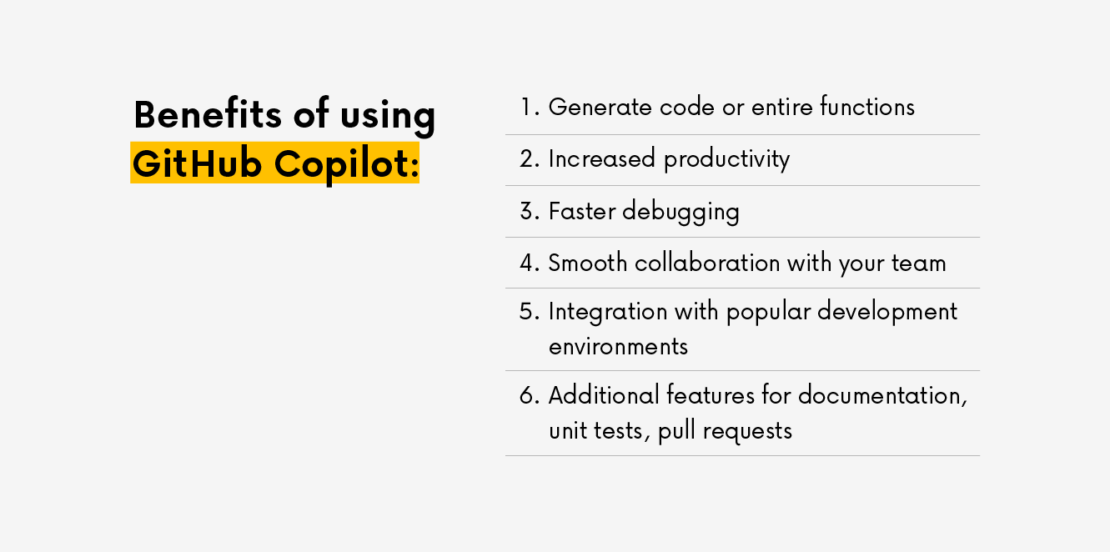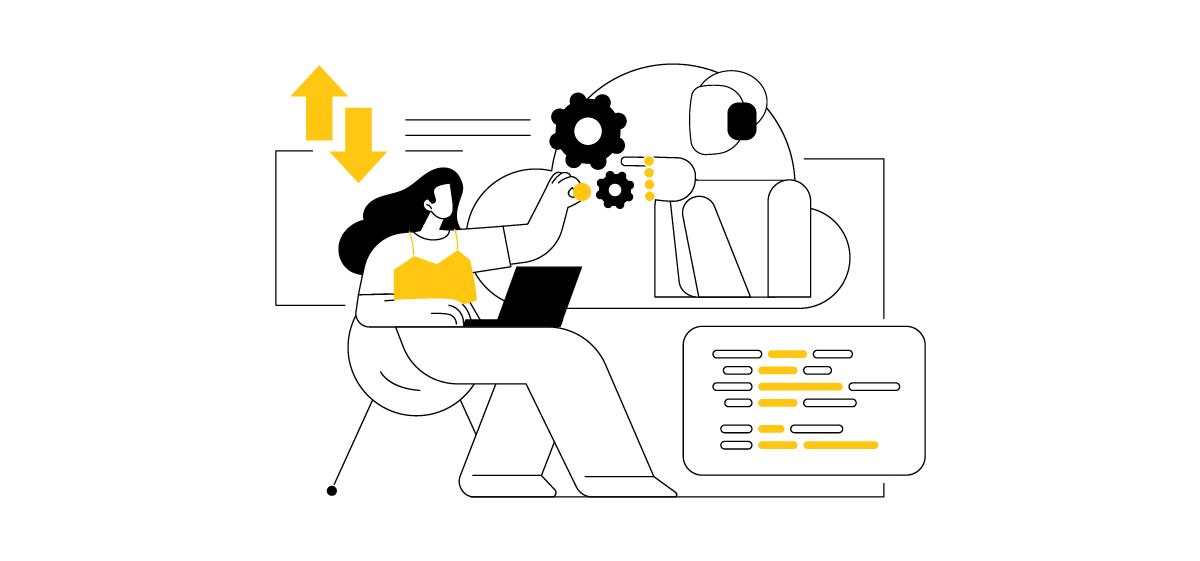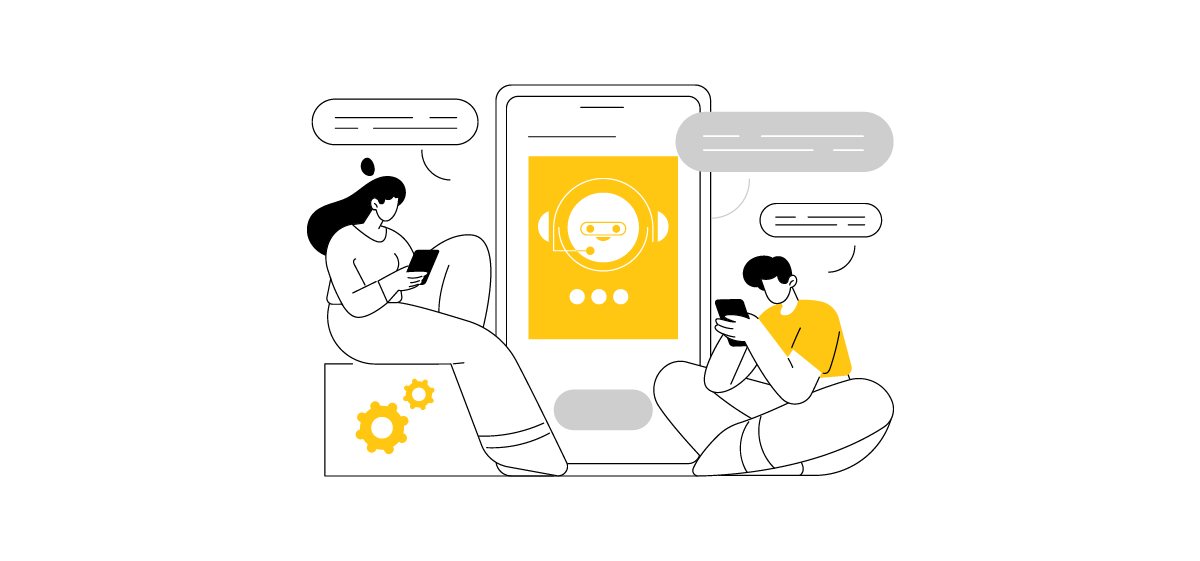
In the business world, time is money. This is especially true in the era of AI, where competition is increasing and processes are accelerating. Having access to tools that optimize tasks and boost productivity is crucial. Artificial intelligence tools, like GitHub Copilot, won’t replace skilled programmers. Still, those who use them effectively will undoubtedly gain a competitive edge in the market.
Introducing these tools into daily operations can significantly reduce operating costs and increase profits. Why? While it’s impossible to list all the benefits, implementing Microsoft GitHub Copilot can help address several key issues, including programmer overload, human error, and high operational costs.
These improvements translate into greater efficiency, enhanced productivity, and increased competitiveness for the company.
Now, let’s dive into the specifics and discuss the main features of Microsoft GitHub Copilot and the benefits of using this tool.
Table of Contents
Thinking Beyond the Code: What GitHub Copilot Really Is
GitHub Copilot is an AI-based coding assistant developed by GitHub in partnership with OpenAI. Its goal is to assist developers by providing automatic code suggestions. Announced in June 2021, the project quickly gained popularity for its ability to generate code based on context and natural language comments. Copilot uses the OpenAI Codex model and is trained on many publicly available source codes.
Understanding the right techniques and use cases is essential for getting the most out of GitHub Copilot.
Key benefits of GitHub Copilot
GitHub Copilot offers real-time code suggestions tailored to the context and actions of individual users.
The benefits of using GitHub Copilot include:
- Code Generation: Copilot can generate code or entire functions based on comments and existing code, increasing productivity and reducing repetitive tasks.
- Productivity Boost: According to Microsoft analytics, Copilot can help developers write up to 55% faster code.
- Debugging Assistance: Copilot suggests possible causes and solutions, helping programmers debug their code more efficiently.
- Collaboration and Knowledge Sharing: GitHub Copilot is integrated with various development environments, including Visual Studio Code, Visual Studio, JetBrains IDEs, and Neovim, making collaboration and knowledge sharing easier.

On the other hand, the higher version of Copilot X based on the newer model, GPT-4, includes additional features such as:
- GitHub Copilot Chat: An additional IDE window that understands the current file’s context.
- AI support for tags in pull request descriptions.
- Integrated documentation within the new interface, with AI answering a series of questions.
- Copilot CLI: A version of Copilot that operates within the terminal.
Case Study: Copilot’s Accelerating Development: From Idea to Working Code in Record Timeon the work of developers
A study by the agency Harness Software Engineering Insights SEI on the impact of GitHub Copilot on developer productivity focused on the number of pull requests (PRs) and cycle time. The findings revealed that integrating GitHub Copilot led to a 10.6% increase in pull requests and a 3.5-hour reduction in cycle time. This demonstrates how Copilot can streamline development workflows and enhance team collaboration.
Collaborating with Copilot: How Developers and AI Work Together
GitHub Copilot can significantly enhance the software development life cycle (SDLC) by offering AI-based assistance at various stages. Here’s how Copilot can contribute to each phase of the SDLC:
1. Provide context for requirements
Copilot can generate preliminary drafts of documents containing requirements based on user input and existing documentation. Utilizing Natural Language Processing (NLP), it can also interpret user stories or requirements written in natural language and convert them into technical specifications.
2. System design
Another advantage of GitHub Copilot is its ability to suggest code snippets and design patterns that adhere to best practices, aiding in the creation of robust system architectures. It can also assist in generating UML diagrams and other design models based on system requirements.
3. Software development
This tool is particularly valuable because Copilot’s standard code generation significantly reduces the time programmers spend on repetitive tasks. Additionally, it learns from the codebase, adapting its suggestions to the project’s coding style and conventions, which helps programmers write code faster and with fewer errors.
4. Testing
Copilot assists in generating unit and integration tests from code, improving test coverage. It also helps identify potential bugs more quickly and recommends fixes during the coding process.
5. Implementing
As part of CI/CD integration, Copilot helps write scripts to automate deployment processes more efficiently. It simplifies the management of configuration files and deployment scripts, ensuring consistency across environments.
6. Maintenance and support
Refactoring code, updating documentation, and generating detailed descriptions for pull requests make it easier for team members to review changes.
It’s essential to check the accuracy and relevance of the generated content, especially if the initial results are unsatisfactory. GitHub Copilot can create content, but human oversight is required to ensure it meets established standards and expectations.
What about the security issue at Copilot?
Some challenges associated with Copilot include privacy concerns. Generative AI can produce personal and sensitive information, as it may be trained on datasets containing such data. In sectors like healthcare and financial services, inadequate safeguards can lead to privacy breaches if this information ends up in the wrong hands. Unfortunately, this risk is inherent in the GitHub Individual license, with no disabling option.
However, this doesn’t mean we’re doomed to fail in safeguarding data. To protect your data when using GitHub Copilot, consider the following key practices, such as:
- Data encryption
- Appropriate access management
- Regular updates
- Use of a system for preventing vulnerable points of attack (blocking dangerous coding patterns in real-time)
- Using at least a licensed Business to prevent training the model with our code if it is not desired
Summary
Microsoft Copilot is a powerful tool that can significantly boost business productivity by providing fast, complex, and accurate answers. Most importantly, it helps developers focus on strategic tasks, enhancing overall software development efficiency.
For additional resources to explore Copilot further, check out the GitHub Copilot Documentation. You can also find valuable insights and discussions in developer communities and forums, such as Stack Overflow’s GitHub Copilot section and the r/GitHub Copilot subreddit.
At VM.PL, we offer training workshops on using Microsoft Copilot. If you want to learn more about prompt-based programming and would like to explore practical examples, please get in touch with us.













